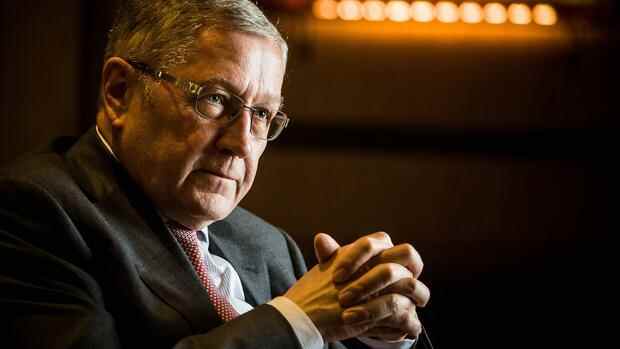The long-standing ESM director is leaving.
(Photo: imago/GlobalImagens)
Klaus Regling goes as he came: quietly, without making a fuss. As a farewell gift, the finance ministers in the euro group gave him a few bottles of wine and lots of chocolate on Monday evening. “There’s a rumor going around that I like chocolate,” Regling commented dryly as usual.
The mischievous economist, who celebrated his 72nd birthday on the day of his farewell party, will be remembered as “Mister Euro-Rescue”. “He was already in the Eurogroup before it was even called the Eurogroup,” remarked EU Monetary Affairs Commissioner Paolo Gentiloni. That was in the late 1990s, when Regling was working on the introduction of the common currency in the EU Commission.
In the debt crisis ten years ago, the native of Lübeck was appointed the first head of the euro rescue package ESM. He was responsible for the billion dollar programs for the five countries Greece, Ireland, Portugal, Spain and Cyprus.
Overall, the bailout has granted 300 billion euros in loans – and thus held the monetary union together. From today’s perspective, this sum seems small, Regling smiles, alluding to the gigantic relief packages during the corona pandemic and the Ukraine war.
Top jobs of the day
Find the best jobs now and
be notified by email.
At the time, one or two countries were about to be expelled, says Regling. He sees the fact that it didn’t get that far as his greatest success. If just one country had had to leave the euro zone, “it would have weakened us all,” he emphasizes. Every minor crisis would then have led to investors on the financial markets betting on the next exit.
Four successor candidates failed
From his point of view, this danger has been averted – even if there is already speculation about a new euro crisis when he leaves. Inflation driven by the Ukraine war is driving interest rates up. Nevertheless, Regling considers a debt crisis to be unlikely in the next few years because the interest burden is sustainable in all countries in the medium term.
But the next crisis will definitely come, he says. And you never know from where. His advice to his successor is therefore: stay agile, always be prepared. “We have developed the ability to deal with whatever may come.”
>> Read here: IMF calls on the EU to jointly borrow against the energy crisis
The successor has still not been determined, although Friday is Regling’s last working day. His deputy would be available as an interim solution. But the pressure on the 19 euro finance ministers is growing to finally agree on a new director. Four candidates have already failed, new names are not yet known.
On Thursday, the finance ministers want to make the next attempt in a video link. It is “disappointing” that there is no successor, says Regling. But one shouldn’t “overdramatize” it either. It is important for the financial markets that the ESM continues to be able to act, and care has been taken to ensure that.
Institution with a massive crisis of meaning
The newcomer finds an institution that functions silently, but is also going through a massive crisis of meaning. The fund has not been tapped since 2018. The ESM loans are scorned because in many countries they are associated with a stigma of failure: those who go to the ESM have no alternative. Instead, there is now the Corona reconstruction fund, which offers the countries better conditions.
Nevertheless, the ESM is not superfluous, argues Regling. In contrast to the reconstruction fund, it is ultimately a crisis fund that steps in in acute cases. This is how funds were made available during the pandemic. Even if these were not called up, their mere existence calmed the financial markets. In the energy crisis, ESM resources could be mobilized for similar purposes, he says.
Regling has always advocated incurring more community debt. The euro zone needs more secure bonds, which creates additional stability. With this argument he regularly encounters resistance in Germany. But even the FDP has now made its peace with the rescue package. This is not least thanks to Regling’s constant persuasion.
After his departure, he will now move from Luxembourg to Munich to his family. He just doesn’t want to be a pensioner. He’ll look for some job, he says. “I’m sure it will have something to do with Europe.”
More: Government plans “defense shield” of up to 200 billion euros against high energy prices
